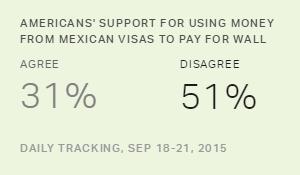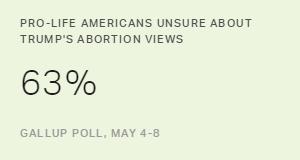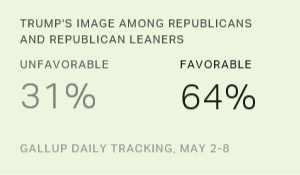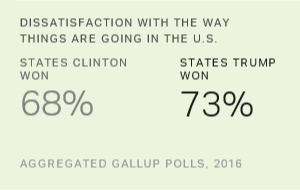We won't know what the new U.S. president will do or attempt to do in his or her first 100 days in office until that event actually takes place. But we can certainly make some good approximations. In the case of Donald Trump, those approximations are helped along by a series of interviews he gave to The New York Times a few weeks ago -- in which he explained the actions he'd attempt to do upon occupying 1600 Pennsylvania Ave. should he win the election.
How would these plans fit in with the views of the average American? From what we know now, it appears that a number of Trump's high-profile actions would not be all that compatible with public opinion. Among those are his vows to build a wall on the Mexican border, to ban Muslims from coming into the U.S., to scrap trade treaties and to repeal the Affordable Care Act. Each suggested action has less than majority public support at this time, although things could change if Trump were to run a persuasive campaign in which he convinced more Americans of their value.
But there is one action Trump emphasizes he would take in his first 100 days that would, in fact, be directly in line with what the public would like to see done. According to the Times, Trump would start "building a government based on relationships," and presumably would continue trying to unite Republicans with disaffected Democrats and independents as he says he will in the remaining six months before the election.
Remember that the public's main criticism of Congress (with its very low overall ratings) is its lack of comity, cooperation and compromise -- along with the fact that members of Congress bicker and adhere rigidly to principle rather than engaging in debate and moving toward accomplishments that are supposed to define the body. Thus, if Trump appears to be flexible in his approach to those from all parties and ideologies, and does, in fact, work toward getting these groups to work together, it would be a very strong positive as interpreted by the average American.
This is not so for his other proposals. Americans are all in favor of stopping immigrants from entering this country illegally, but Gallup testing shows there is more opposition than support for Trump's idea of building a wall on the border that will be paid for by Mexico. A March Pew Research poll shows the same thing (their test, interestingly, systematically varied the word "fence" with the word "wall" and found slightly higher opposition with the latter than the former).
Americans' attitudes toward trade treaties are complex, but the public feels that trade provides more of an opportunity than a threat, and there is no strong support for the idea of withdrawing from these treaties.
The idea of banning Muslims from coming into the country? Our policy-testing database shows that the public rejects this proposal, and a variety of other polls conducted by other organizations shows the same thing. Trump would be moving directly against public opinion if he took this action.
I've just reviewed new evidence about the Affordable Care Act, and I think it is fair to say that attitudes about the ACA are complex (not a new conclusion!). To begin with, Americans break even at this point in their views of the ACA, suggesting that Trump and other Republicans' antipathy toward the act is not shared by the majority of Americans. But the idea of repealing the ACA carries with it the necessary corollary question of what would replace it. And the data show that at least some who would like to see it repealed actually want it replaced with an even more liberal law (i.e., single-payer, federally funded healthcare insurance) -- not something Trump is advocating as far as I know. To be squarely in line with public opinion, Trump would attempt to reduce the emotional reactions that the ACA has engendered and instead follow the public's lead in reviewing what is good, and bad, about the ACA and making proposals informed by those findings. But a major consideration in any conversation about healthcare in this country has to be the evidence found across several different questions asked by Gallup and other firms that the majority of Americans have a positive reaction to the Bernie Sanders' advanced idea of a single-payer Medicare-for-all system financed by the government.




